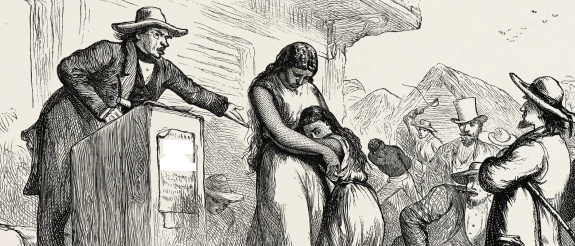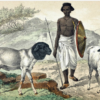
by f. Luis CASASUS, General Superior of the men’s branch of the Idente missionaries.
Paris, March 14, 2021. | Fourth Sunday of Lent.
2Chronicles 36: 14-16.19-23; Letter to the Ephesians 2: 4-10; Saint John 3:14-21.
In one of the countries where slavery was legal in the 19th century, a gentleman happened upon a slave-bidding in a crowed street. The gentleman studied the group of slaves waiting nearby. He paused when he saw a young girl standing at the back. Her eyes were filled with fear. She looked so frightened.
As the auctioneer opened the bidding for the girl, the gentleman shouted out a bid that was twice the amount of any other selling price offered that day. There was silence for an instance, and then the gavel fell: Sold to the gentleman. The rope, which bound her, was handed to the man. The young girl stared at the ground. Suddenly she looked up and spat in his face. Silently, he reached for a handkerchief and wiped the spittle from his face. He smiled gently at the young girl and said, “Follow me“. She followed him reluctantly. When a slave was set free, legal documents were necessary. The gentleman paid the purchase price and signed the documents.
When the transaction was complete, he turned to the young girl and presented the documents to her. Startled, she looked at him with uncertainty. Her narrowed eyes asked: What are you doing? The gentlemen said: Here, take these papers. I bought you to make you free. As long as you have these papers in your possession, no man can ever make you a slave again. The girl looked into his face. What was happening? Slowly, she said: You bought me, to make me free?” …”You bought me, to make me free? She fell to her knees and wept at the gentleman’s feet. Through her tears of joy and gratitude, she said: You bought me, to make me free….I’ll serve you forever!
This true story is more than a happy ending anecdote. It reflects the deep aspiration of those who are grateful to have received freedom. That, no more and no less, is our condition, yours and mine. Of course, the difference is that the price paid for our liberation is much higher and deserves from us a similar reaction: I will serve you forever! And we well know that this service is realized through our dedication to our neighbor.
The central theme of today’s readings is that our salvation is the free gift of a merciful God given to us through Jesus His, Son. The history of the people of Israel, of the Catholic Church and our personal lives teach us, like what happened to the slave girl, that God’s mercy is realized in ways that are difficult to anticipate. In the First Reading we learn how God allowed Cyrus the Great, a pagan conqueror, to become the instrument of His mercy and salvation for His chosen people who were in exile in Babylon.
The words of Jesus to Nicodemus in the Gospel emphasize our Father’s enduring mercy. It is important that we read them once again: The Father loved the world so much that he gave his only Son, so that everyone who believes in him may not be lost but may have eternal life. For God sent his Son into the world not to condemn the world, but so that through him the world might be saved.
These words speak to a fundamental aspect of sinful humanity. From our earliest days we long for affirmation and dread judgment. Sometimes the dread of God’s ultimate judgment blocks any meaningful relationship with a merciful and loving Father.
Those who refuse to believe in this sign of our Father’s love, condemn themselves, as the Israelites in their infidelity brought judgment upon themselves. But God did not leave Israel in exile, and he does not want to leave any of us dead in our transgressions.
We are God’s handiwork, saved to live as his people in the light of his truth. Midway through this season of repentance, let us again behold the Pierced One, and rededicate ourselves to living the good works (Jn 19: 37) that God has prepared us for.
It is Jesus, the crucified who, reversing the expectations and values of the world, judges the defeats a victory, service a power, poverty a wealth, the loss a gain, humiliation a triumph, death a birth.
When someone is rowing a boat, it is not sufficient to know where he has to go, nor is it enough to row hard. He must continually use the rudder, redirect his forces, reorient the prow. May this image serve to illustrate the role of our freedom, placed at the service of prayer and overcoming the division between intelligence and will that always besets us. Jesus proclaims that the fulfilled well-focused man according to God is one who has voluntarily made himself slave for love, servant of his brothers even to the point of dying for them in many different forms.
Today’s Gospel text illustrates with exceptional clarity our inner fracture, due to sin and the fragility it produces: the light came into the world, but people preferred darkness to light, because their works were evil. For everyone who does wicked things hates the light and does not come toward the light, so that his works might not be exposed. But whoever lives the truth comes to the light, so that his works may be clearly seen as done in God.
No one can live divided. We are not made to serve two masters. As the Second Reading says, that is tantamount to being dead, dead in our transgressions.
The First Reading, recalling the errors of the people of Israel, explains the consequences of this division, of believing in a true God and at the same time building new idols, going “from infidelity to infidelity“. The unhappiness and dissatisfaction that we then experience are not God’s punishment, as could be interpreted from this Book of Chronicles, but the consequence of the snakes that wound, that poison the existence and put life off: pride, envy, resentment, unruly passions.
The logic of the book of Chronicles surprises us and needs to be clarified. In the face of this touchy and susceptible Lord we are shocked and we wonder: what is this God who gets angry like a man, acts like an accountant, notes the payables and receivables, coolly pulls the money and punishes severely, involving even the innocent?
The language used is frequent in the Old Testament. It presents as God’s punishment that which, in reality, is the result of human sinfulness. Do not bring about your own death by your wrong way of living. Do not let the work of your hands destroy you. God did not make death, nor does he rejoice in the destruction of the living (Wis 1:12).
It is the living image of the end of each story between God and man: the last word will always be his merciful love.
Nicodemus comes to Jesus in a state of confusion and spiritual blindness, and he can not seem to grasp what Jesus is trying to teach him. Whether he is being stubborn or simply misguided in his lack of understanding, Nicodemus is completely in the dark when it comes to comprehending how God actually works. Each of us goes through many moments similar to those of this wise Pharisee. A mature disciple of Jesus, like him, knows how to walk in moments of light and darkness, knowing that at times we must enjoy divine mercy in a joyful way and at other times undergo long purifications, aimed only at strengthening our union with the Most Holy Trinity.
Nicodemus shows us that sometimes we do not always walk in a struck-by-lightning experience. Sometimes, like this distinguished member of the Sanhedrin, we walk in the dark, with difficulty and impotence of all kinds. But we know that he persevered, even though we do not have much news of his life. The last time we see him, he is at the foot of the cross, with Joseph of Arimathea, taking down Jesus’ broken body and preparing it for burial.
Here in the heart of Lent, God calls us into a face-to-face conversation. He is talking directly to you and to me and to everyone who in some way suspects that He is our only hope. Ours are the deeds that will be held up to the light in judgment. And ours is the belief that is being called into question. How does our belief show itself in the things we do? When our deeds are held up to the light, is it clear that they have been “done in God?”
God loves us for who He is., not because of our worthiness. God loves us because God is love. That is the primary identity out of which God operates. He keeps loving us through our rebellion, through our complacency, through our poor attempts to keep control in our own hands.
As St. Augustine puts it: God loves each one of us as if there were only one of us to love. It also explains to us the universality of the love of God. God’s motive is love and God’s objective is salvation.
Jesus, in his conversation with Nicodemus, states that rebirth by water and the Spirit is an essential condition for entering the Kingdom of God. Jesus explains to the righteous Rabbi that he must believe Jesus’ words because he is the Son of God. He further explains God’s plan of salvation by referring to the story of Moses and the brazen serpent. He also reveals the Good News that God will show His love for mankind by subjecting His own Son to suffering and death.
Let us not look at Nicodemus’ encounter superficially. Rather, let us learn from him how to approach Jesus when darkness seems to invade our lives. His gesture is a living example of Intellectual Acceptance of the Gospel.
The crucifix, the symbol of the “lifted up” Jesus, holds a central place in our Churches because it is a forceful reminder not only of God’s love and mercy, but also of the price of our salvation. Hence, no Christian home should be without this symbol of God’s love. The crucifix invites us to more than generosity and compassion. It inspires us to remove the suffering of our neighbor’s misery. It encourages us not only to feel deep sorrow for another’s suffering, but also to try our best to remove that suffering. Hence, let us love the cross, wear its image and carry our own daily cross with joy. It also means the end of our slavery here, now, in this world.








